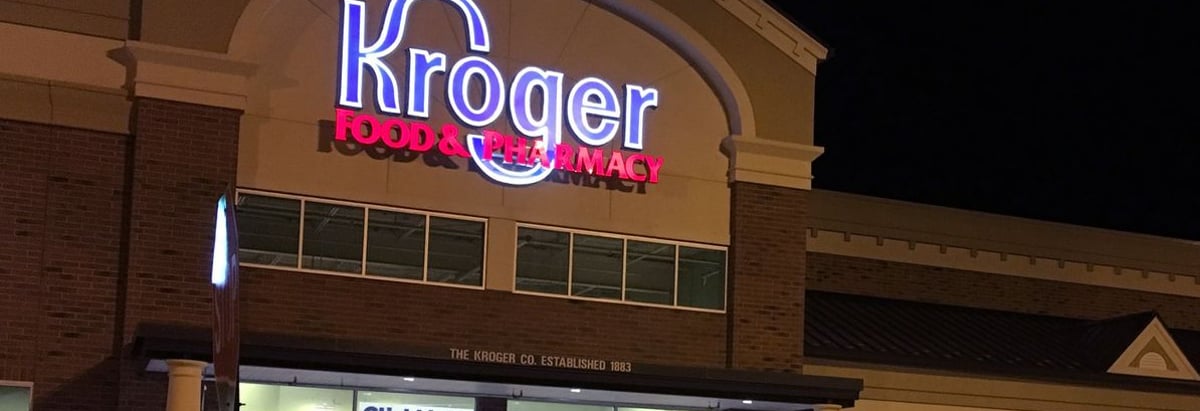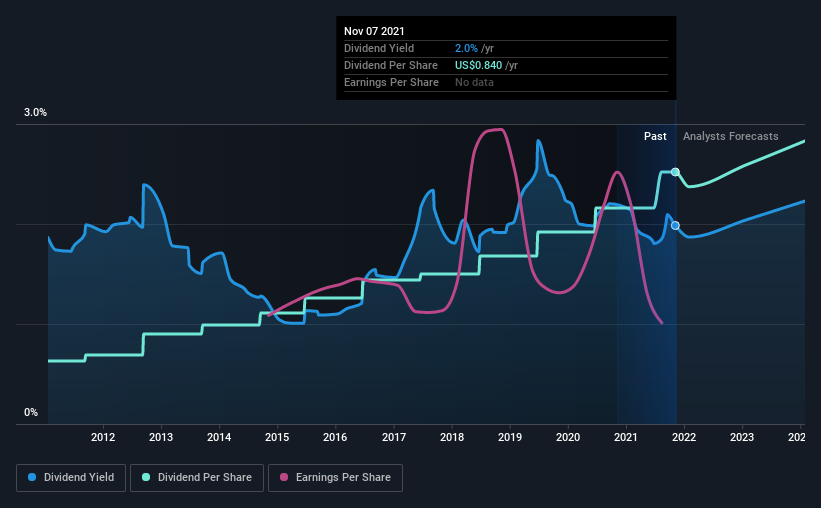- United States
- /
- Food and Staples Retail
- /
- NYSE:KR
Three Days Left To Buy The Kroger Co. (NYSE:KR) Before The Ex-Dividend Date

Readers hoping to buy The Kroger Co. (NYSE:KR) for its dividend will need to make their move shortly, as the stock is about to trade ex-dividend. The ex-dividend date occurs one day before the record date which is the day on which shareholders need to be on the company's books in order to receive a dividend. It is important to be aware of the ex-dividend date because any trade on the stock needs to have been settled on or before the record date. Thus, you can purchase Kroger's shares before the 12th of November in order to receive the dividend, which the company will pay on the 1st of December.
The company's next dividend payment will be US$0.21 per share. Last year, in total, the company distributed US$0.84 to shareholders. Calculating the last year's worth of payments shows that Kroger has a trailing yield of 2.0% on the current share price of $42.32. We love seeing companies pay a dividend, but it's also important to be sure that laying the golden eggs isn't going to kill our golden goose! We need to see whether the dividend is covered by earnings and if it's growing.
Check out our latest analysis for Kroger
Dividends are typically paid out of company income, so if a company pays out more than it earned, its dividend is usually at a higher risk of being cut. Kroger paid out a comfortable 49% of its profit last year. That said, even highly profitable companies sometimes might not generate enough cash to pay the dividend, which is why we should always check if the dividend is covered by cash flow. Thankfully its dividend payments took up just 33% of the free cash flow it generated, which is a comfortable payout ratio.
It's positive to see that Kroger's dividend is covered by both profits and cash flow, since this is generally a sign that the dividend is sustainable, and a lower payout ratio usually suggests a greater margin of safety before the dividend gets cut.
Click here to see the company's payout ratio, plus analyst estimates of its future dividends.

Have Earnings And Dividends Been Growing?
When earnings decline, dividend companies become much harder to analyse and own safely. If earnings decline and the company is forced to cut its dividend, investors could watch the value of their investment go up in smoke. Readers will understand then, why we're concerned to see Kroger's earnings per share have dropped 5.8% a year over the past five years. Such a sharp decline casts doubt on the future sustainability of the dividend.
Many investors will assess a company's dividend performance by evaluating how much the dividend payments have changed over time. Since the start of our data, 10 years ago, Kroger has lifted its dividend by approximately 15% a year on average.
To Sum It Up
Is Kroger worth buying for its dividend? Kroger has comfortably low cash and profit payout ratios, which may mean the dividend is sustainable even in the face of a sharp decline in earnings per share. Still, we consider declining earnings to be a warning sign. Overall, it's not a bad combination, but we feel that there are likely more attractive dividend prospects out there.
In light of that, while Kroger has an appealing dividend, it's worth knowing the risks involved with this stock. Our analysis shows 4 warning signs for Kroger and you should be aware of them before buying any shares.
If you're in the market for dividend stocks, we recommend checking our list of top dividend stocks with a greater than 2% yield and an upcoming dividend.
Valuation is complex, but we're here to simplify it.
Discover if Kroger might be undervalued or overvalued with our detailed analysis, featuring fair value estimates, potential risks, dividends, insider trades, and its financial condition.
Access Free AnalysisThis article by Simply Wall St is general in nature. We provide commentary based on historical data and analyst forecasts only using an unbiased methodology and our articles are not intended to be financial advice. It does not constitute a recommendation to buy or sell any stock, and does not take account of your objectives, or your financial situation. We aim to bring you long-term focused analysis driven by fundamental data. Note that our analysis may not factor in the latest price-sensitive company announcements or qualitative material. Simply Wall St has no position in any stocks mentioned.
Have feedback on this article? Concerned about the content? Get in touch with us directly. Alternatively, email editorial-team (at) simplywallst.com.
About NYSE:KR
Undervalued established dividend payer.
Similar Companies
Market Insights
Community Narratives





